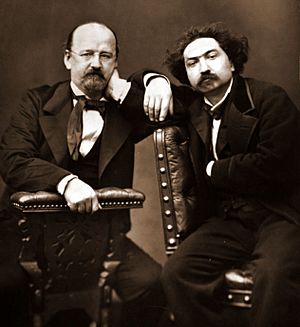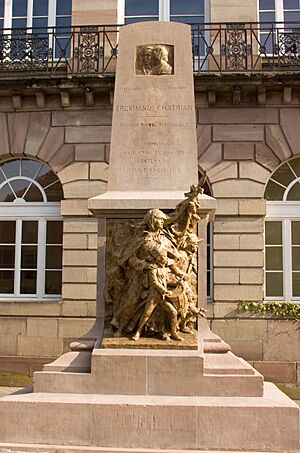Erckmann-Chatrian facts for kids
Erckmann-Chatrian was the special name used by two French writers, Émile Erckmann (born 1822, died 1899) and Alexandre Chatrian (born 1826, died 1890). They wrote almost all of their books and stories together.
Contents
Their Story
Both Erckmann and Chatrian were born in a part of France called Meurthe. This area is now known as Moselle and is in the Lorraine region, in the very northeast of France.
They became lifelong friends in 1847. They were known for writing exciting stories about soldiers and spooky ghost stories, often set in the countryside. Sadly, they had a disagreement in the mid-1880s and stopped writing together. Chatrian passed away in 1890, and Erckmann then wrote a few things on his own.
Many of their works were translated into English by a writer named Adrian Ross.
Some of their most famous scary stories in English include "The Wild Huntsman," "The Man-Wolf," and "The Crab Spider." Famous ghost story writers like M. R. James and H. P. Lovecraft really liked these tales.
Erckmann-Chatrian also wrote many historical novels. Some of these books spoke out against the government at the time, called the Second French Empire. They believed in a republic (where people vote for their leaders) instead of a king or emperor. Because of their ideas, famous writers like Victor Hugo and Émile Zola praised them. However, a newspaper called Le Figaro strongly criticized them.
They became very popular from 1859 onwards. People liked their stories because they showed strong national pride and were against war and German influence. Even though their books sold well, they often had problems with political censorship throughout their careers. Usually, Erckmann wrote the novels, and Chatrian mostly wrote the plays.
Every summer, a special festival is held in their honor in Phalsbourg, the town where Erckmann was born. This town also has a military museum that displays copies of their books.
Their Books and Stories
Early Works
Many of these were not published until the 1860s.
- Malédiction (meaning 'Curse'); Vin rouge et vin blanc (meaning 'Red Wine and White Wine') (1849)
- L’Alsace en 1814, a play (1850)
- Science et génie, a fantasy story (1850)
- Schinderhannes ou les Brigands des Vosges (meaning 'Schinderhannes or the Brigands of the Vosges') (1852)
- Le Bourgmestre en bouteille (meaning 'The Mayor in a Bottle') (by Erckmann, 1856)
- L’Illustre Docteur Mathéus (meaning 'The Famous Doctor Mathéus') (1856)
- Contes fantastiques: Le Requiem du corbeau, Rembrandt et L’Œil invisible (meaning 'Fantastic Tales: The Raven's Requiem, Rembrandt and The Invisible Eye') (1857)
- Gretchen et La Pie (meaning 'Gretchen and The Magpie') (1858)
Works from 1859 Onwards
- Les Lunettes de Hans Schnaps (meaning 'Hans Schnaps's Glasses') (1859)
- Le Rêve du cousin Elof (meaning 'Cousin Elof's Dream') (1859)
- La Montre du doyen (meaning 'The Dean's Watch') (1859)
- Hugues-le-loup (meaning 'Hugh the Wolf') (1859) – this famous story about a werewolf was translated into English as "The Man-Wolf" (1876)
- Madame Thérèse (1863)
- Histoire d’un conscrit de 1813 (meaning 'Story of a Conscript of 1813') (1864)
- L’Ami Fritz (meaning 'Friend Fritz') (1864)
- Waterloo (a follow-up to Conscrit de 1813, 1865)
- Le Blocus (meaning 'The Blockade') (1866)
- Le Juif polonais, a play (meaning 'The Polish Jew') (1867)
After the Franco-Prussian War
- Histoire du plébiscite racontée par un des 7 500 000 oui, an essay (meaning 'Story of the Plebiscite told by one of the 7,500,000 yes votes') (1871)
- Les Deux Frères (meaning 'The Two Brothers') (1871)
- Le Brigadier Frédéric, histoire d’un Français chassé par les Allemands (meaning 'Brigadier Frédéric, story of a Frenchman chased by the Germans') (1874)
- Souvenirs d’un ancien chef de chantier à l’isthme de Suez (meaning 'Memories of a Former Site Manager at the Isthmus of Suez') (1876)
- Le Banni (meaning 'The Banished One') (a follow-up to Le Brigadier Frédéric, 1881)
- Époques mémorables de l’Histoire de France: avant ’89 (meaning 'Memorable Periods of French History: before '89') (1884)
English Translations
- The Man-Wolf and Other Tales (1876, reprinted 1976)
- Strange Stories (1880)
- Best Tales of Terror (1980) edited by Hugh Lamb
See also
 In Spanish: Erckmann-Chatrian para niños
In Spanish: Erckmann-Chatrian para niños
 | Ernest Everett Just |
 | Mary Jackson |
 | Emmett Chappelle |
 | Marie Maynard Daly |



